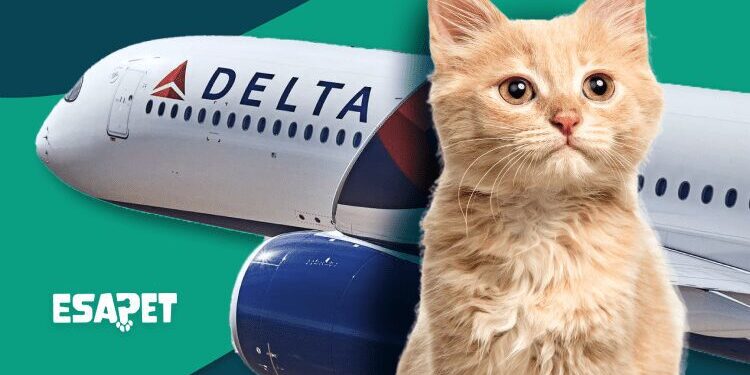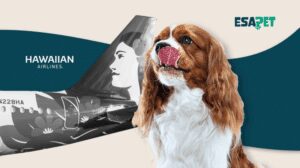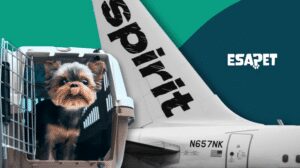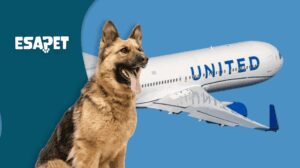Delta Airlines Pet Policy – Traveling With ESAs and PSDs in 2026

Thinking about flying with your pet with Delta Airlines? The Delta Airlines pet policy is very pet friendly. You can bring your pet with you in-cabin to select destinations. Alternatively, you can ship it using the Delta Cargo shipping service.
This guide provides all the details you need for a seamless travel experience with your Emotional Support Animal (ESA) or Psychiatric Service Dog (PSD). We’ll explore how Delta’s rules might affect your travel plans, ensuring you’re well-prepared for your next flight, so stay tuned.
Delta Airlines Pet Travel Policies
Delta Airlines allows small dogs, cats, and household birds to travel in the cabin. They must remain inside an approved pet carrier under the seat throughout the travel journey. Larger pets that don’t fit in the cabin can be shipped via Delta Cargo. Delta Air Cargo is the airline’s special shipping service offering safe and secure animal transport.
Passengers looking to book for pets must do so between 3 to 14 days before departure. The airline doesn’t accept walk-in reservations for cargo at this time. Additional restrictions apply when flying with pets in cargo during extreme weather. This is to ensure the animals’ safety and well-being.
For international travel, pets need all necessary documentation. This includes health certifications and vaccinations as dictated by the destination’s regulations. Delta provides detailed international travel guidelines on its website to help pet owners prepare for these requirements.
TL;DR: Delta Air Lines allows in-cabin travel for small pets. Larger pets can travel in the cargo hold, but booking is required. Travel restrictions may apply during extreme weather. International trips require specific health documents.
Delta Airlines Fees for Pet Travels
Delta Airlines implements a structured fee system for pets traveling in the cabin. The fee structure is based on the travel destination. For passengers flying to or from the USA, Canada, Puerto Rico, and the Virgin Islands, the airline charges a pet fee of $95. This fee ensures that all necessary accommodations for pets are handled efficiently during the flight.
Delta sets the fee at $200 for broader international travel. This fee reflects the added complexities of international pet transport. A reduced fee of $75 is charged for flights to and from Brazil.
ESAs are Exempt from Pet Fees for Housing |
According to the FHA, Emotional Support Animals and Service Dogs are exempt from any housing pet fees, deposits or pet rents. |
Delta Airlines Standards for ESA and Service Animals
The Delta pet policy requires animals traveling in-cabin to be housed in an approved pet carrier. Carry-on pets must be soft side and leakproof, with adequate ventilation. Additionally, they must be large enough so that the animal can stand and turn around comfortably.
You’re allowed to bring only one pet carrier on board, but more than one pet can be contained in a carrier. For instance, one female cat or dog can travel if the kittens or puppies are between 10 weeks and six months old. Note that if you carry two pets in one carrier, they must be of the same breed.
Delta’s pet carrier requirements are unlike those of some other airlines. Specifically, they are designed to give different types of emotional support animals maximum safety and comfort during the flight.
Small dogs, cats, and household birds can travel in the cabin on domestic flights. For starters, these are flights within the U.S., Canada, the US Virgin Islands, and Puerto Rico. However, pets are not allowed in the First Class, Business Class, or Business Elite sections on international flights.
Pets must meet minimum age requirements that vary by the destination. Your pet must be at least 10 weeks old to travel in the cabin within the U.S.
If traveling to the U.S. on an international flight, it must be at least 16 weeks old. Pets must be at least 15 weeks old to travel to the European Union. Delta prohibits pet travel to specific international locations unless they are service animals.
Delta Airlines and the ACAA
In 2021, the Air Carrier Access Act (ACAA) was updated, leading to significant changes in how airlines treat emotional support animals (ESAs). Previously, ESs were allowed to fly in the cabin just like service animals.
However, following the ACAA update, airlines were allowed to set their own policies on ESAs. Delta Airlines responded to this change by updating its regulations. Right now, it no longer recognizes ESAs under the same provisions as service animals.
This means that while service animals continue to be permitted on flights, ESAs are subject to Delta’s pet policies, including restrictions and additional fees.
Delta’s current ESA policy treats ESAs similarly to regular pets. This adjustment was necessary to ensure safety and compliance with the updated ACAA guidelines. Delta may only accept transportation to an ESA if it meets its specific requirements. Or if it threatens the safety or comfort of other passengers.
Thus, passengers traveling with ESAs must prepare accordingly. They must understand and comply with Delta’s pet policy before traveling. Compliance with Delta’s pet travel standards is vital for a smooth travel experience.
Allowed Support Animals
Delta Airlines has specific Emotional Support Animals (ESAs) rules. Those rules differ from those of other support and service animals. Here’s an updated table including pets allowed, how they can travel, and the associated fees and basic requirements.
Animal | Permitted on | Fees |
| Service Dogs | In-cabin | No fee |
| Service Cats | In-cabin | No fee |
| Household Birds | In-cabin (domestic flights only) | Varies by route |
| Small Dogs | In-cabin or cargo | Varies by route |
| Small Cats | In-cabin or cargo | Varies by route |
Take Note:
- Service Dogs and Cats: Allowed in-cabin at no additional cost. They must meet service animal certification requirements.
- Household Birds: Permitted in the cabin on local flights. Delta prohibits birds from flying on international flights or in premium cabins.
- Small Dogs and Cats: Can travel in-cabin or as cargo. Fees for in-cabin travel are around $95 within the US and up to $200 for international travel. Feeds are dependent upon the destination. For cargo, fees and requirements vary based on the route and the size of the pet carrier.
- ESAs: Delta Air no longer recognizes ESAs as service animals. Thus, they must travel as regular pets. This means they can no longer travel in the cabin without a fee. They’re also subject to the same rules and fees as other pets traveling in cargo.
Pet Reservation
Delta Airlines has specific limits on the number of pets allowed per flight. For flights within the United States (except Hawaii), the airline allows up to two pets in First Class, two in Business Class, and four in the Main Cabin. This limitation ensures a comfortable environment for all passengers and crew.
Note that pets are not permitted on international flights in First Class, Business Class, or Business Elite. Likewise, some domestic flights may have restrictions.
Thus, travelers planning to fly with small cats, dogs, or household birds should make reservations well in advance. Confirming space for your pet is essential. Remember, Delta enforces these rules strictly to manage the number of animals on each flight.
Carrier Guidelines
Delta Airlines requires specific carrier dimensions based on the aircraft. Travelers must verify the appropriate cat or dog carrier size in advance. They can do so by contacting Delta Reservations before their flight.
As a rule of thumb, a soft-sided carrier measuring 18″ x 11″ x 11″ (45 cm x 28 cm x 28 cm) is recommended for cabin travel. A carrier this size fits under most airplane seats. As previously mentioned, pets must stay inside carriers throughout the airport and flight.
For pets checked with Delta Cargo, various rigid carrier sizes are permitted, ranging up to 48″ x 32″ x 35″ (122 cm x 81 cm x 89 cm). These carriers must have proper ventilation. They must also have secure closures for security.
Plus, carriers must contain absorbent materials and dishes for food and water. This setup helps maintain the pet’s comfort and safety during their travel journey.
Breed Restrictions on Delta Airlines
Delta Airlines sets specific breed restrictions for the safety of animals during air travel, especially for traveling with brachycephalic (or “snub-nosed”) animals, which are prone to breathing difficulties. The airline prohibits certain dog and cat breeds from flying. Why? Because of the risk of health complications that can arise from the stress of flying.
Allowed Cat Breeds in Cabin:
- Domestic cats (excluding the restricted breeds)
- Siamese
- Maine Coon
- Ragdoll
- Siberian
Allowed Dog Breeds in Cabin:
- Labrador Retriever
- Golden Retriever
- German Shepherd
- Border Collie
- Beagle (excluding the brachycephalic “Pug Nose” variety)
Other Restrictions
Delta imposes several other restrictions for the safety and comfort of pets and passengers:
- Age: Pets must be at least 10 weeks old for domestic travel and 16 weeks old if traveling to the U.S. from abroad.
- Health Certificate: A health certificate from a veterinarian is required for travel. This must be issued within 10 days of travel or 30 days for return trips.
- Weather Restrictions: Delta may restrict pet travel during extreme weather conditions. Temperature restrictions apply specifically to pets traveling in the cargo hold. This is to avoid exposure to potentially hazardous temperatures.
- Carrier Specifications: Carriers must meet specific size and construction standards. The goal is to make sure pets have enough space to stand up, turn around, and lie down comfortably.
- Behavioral Standards: Pets must be well-behaved and not disruptive. Delta reserves the right to refuse travel to pets that display aggressive behavior. Or if a pet appears to be ill at the time of boarding.
Delta Airlines ESA Requirements
Delta Airlines has significantly changed its approach to emotional support animals (ESAs). In line with new industry standards, Delta no longer recognizes emotional support animals as service animals. This policy adjustment means that ESAs are now treated similarly to regular pets. The policy is part of Delta’s efforts to streamline and clarify travel regulations for all passengers.
Allowances
- Previously Registered ESAs: Passengers who had previously registered their ESAs with Delta before this policy change may still receive some accommodations based on their prior arrangements.
Restrictions
- No New ESA Bookings: Delta does not accept new bookings for emotional support animals. All ESAs must now travel under Delta’s standard pet policy, which includes the standard fees and carrier requirements.
- Crate Requirements: For those ESAs that still qualify under previous bookings, Delta Cargo enforces a pet crate height limit of 24 inches (61 cm). There are exceptions for certain cases, such as service animals and military bookings.
- Cabin Travel: ESAs are no longer eligible for any special considerations in the cabin. They are subject to the same regulations as other pets, including carrier size and pet fees.
Delta’s updated policy gives all passengers, including those with ESAs, a consistent and straightforward travel process, emphasizing safety and comfort aboard their flights.
Delta Airlines Guidelines for ESAs and Service Animals
When traveling with Delta Airlines, pet owners should fully understand and comply with the airline’s guidelines for Emotional Support Animals (ESAs) and Service Animals. Delta has updated its policies to treat ESAs as regular pets. This means they are subject to standard pet travel fees and must travel within approved pet carriers.
Service animals, trained to assist individuals with disabilities, are still permitted to travel in the cabin at no additional cost. They must also meet the airline’s requirements, including behavior and size guidelines. Pet owners must check in advance the specific requirements and restrictions for the aircraft and destination they are flying to.
Required Forms and Documents for ESAs
For those traveling with ESAs or Psychiatric Service Dogs (PSDs), certain documentation is required:
ESA Letter or PSD Letter
An ESA or PSD Letter can influence the handling fees, permissions, and restrictions for traveling with your animal.
Whereas both letters must come from a licensed mental health professional, a PSD Letter often requires that the dog demonstrates specific training to assist with a disability. In contrast, an ESA Letter does not require proof of training.
Animals with a PSD Letter are generally recognized under the Americans with Disabilities Act (ADA). They’re allowed broader access and fewer restrictions compared to ESAs. Animals with an ESA Letter are considered pets under new Delta policies and are subject to pet travel fees and carrier regulations.
Behavior Form
The Behavior Form is essential as it certifies that your ESA or PSD can behave properly in a public setting. Delta Airlines requires this form to confirm that the animal poses no threat to the safety or health of passengers and the flight crew.
ESA Pet can offer the Behavior Form as an additional service during the ESA or PSD Letter acquisition process, streamlining the documentation needed for travel.
Health Form
Delta also requires the health form, which details the animal’s medical history and current health status. A veterinarian must issue this form within 10 days of travel to certify that the animal is fit to fly and free from contagious diseases.
This form is also available through ESA Pet. It is provided as an additional service when acquiring an ESA or PSD Letter. This ensures that all health-related travel requirements are met, providing a smoother travel experience.
Getting an Official ESA Letter and Additional Documentation
Obtaining a legitimate ESA (Emotional Support Animal) letter is straightforward. ESA Pet facilitates the process through a simple 3-step process, as follows:
ESA Pets Process – 3 Steps
- Free Pre-Screening: You’ll first undergo a free pre-screening. Here, you’ll answer a few simple questions to determine if you are eligible for an ESA or PSD. This step is crucial in determining if you genuinely need a support animal. It lays the foundations for the next stages. You can start this process by visiting ESA Pet’s website.
- Connect With A Licensed Therapist: After your pre-screening, a licensed therapist from ESA Pet will contact you within 24 to 48 hours. This contact is part of the consultation process, where the therapist will assess your needs and determine how an ESA or PSD could assist you in managing your mental health.
- Receive Your Letter: If your consultation concludes that an ESA or PSD is appropriate for your situation, the therapist will finalize and upload your official ESA or PSD letter to your user portal. This usually happens within 24 to 48 hours of your consultation. Note that residents of California and Arkansas may have a longer turnaround time of up to 30 days due to state-specific regulations.
Get your Official ESA Letter Consultation from a licensed therapist.
Get ESA Letter Now
Prepping the ESA for Travelling
Traveling with an Emotional Support Animal (ESA) requires careful planning and preparation to ensure a smooth and stress-free journey.
Below are some best practices and considerations for prepping your ESA for travel:
Manners Training
Before traveling with an ESA, first, train it in basic manners. This training helps prevent disruptive behaviors like excessive barking or agitation. A calm, well-behaved animal is less likely to cause disturbances or attract unnecessary attention during travel.
Make Sure They Can Hold It
Training your ESA to manage their bathroom needs for the flight is essential. This includes timing their meals and bathroom breaks before the flight to avoid accidents. Additionally, having a plan for long-haul flights where bathroom breaks are not possible is important.
Check International Laws
When traveling internationally with an ESA, check the destination country’s specific entry requirements and quarantine laws. Each country has different regulations regarding pets. And knowing these can prevent any legal issues or quarantines at your destination.
Calming Techniques
To help keep your ESA calm during the flight, familiarize them with their carrier well in advance of your trip. Also, bring along their favorite toy or a piece of clothing with your scent to help soothe and comfort them. You might also explore natural calming supplements or discuss other sedation options with your vet.
FAQs about Delta Airlines Pet Policy
How Strict Is Delta With Pets?
Delta Airlines has a pet-friendly policy. Pets may travel in cabins or cargo, depending on their specific breed, size, and behaviors. Pets must remain in their carriers with the door secured at all times during the flight.
How Much Is the Pet Fee on Delta?
Delta’s pet fee varies depending on the travel route. Typically, it’s $95 for domestic flights and up to $200 for international routes. Flights to Brazil have a reduced fee of $75.
What Paperwork Do I Need to Fly With My Dog on Delta?
To fly with your dog on Delta, you need a current health certificate issued within 10 days of travel, proof of rabies vaccination, and any additional documentation required by the destination country.
Can My Dog Sit on My Lap During a Flight on Delta?
No, pets are not allowed to sit on laps during Delta flights. They must remain in their carrier under the seat in front of you throughout the flight.
Bottom Line – Delta Airlines Pet Policy
Delta Airlines’ pet policy requires adherence to specific guidelines when traveling with pets. Compliance with Delta’s policies is crucial for a smooth journey. So, make sure your ESA is adequately trained and equipped to handle travel conditions. Also, prepare all necessary documentation ahead of time for a seamless travel experience.
Once that’s out of the way, familiarize yourself with the pet fees. Ensuring your pet remains properly secured in its carrier and adhering to international travel regulations are key to successfully navigating Delta Airlines pet policy. These measures are designed to ensure the safety and comfort of all passengers and pets on board Delta flights.




